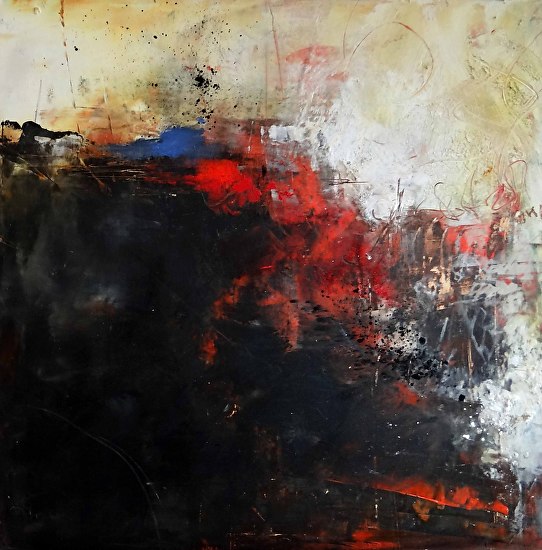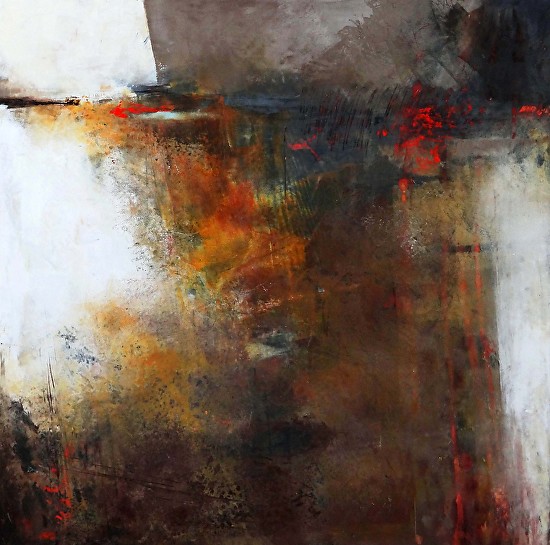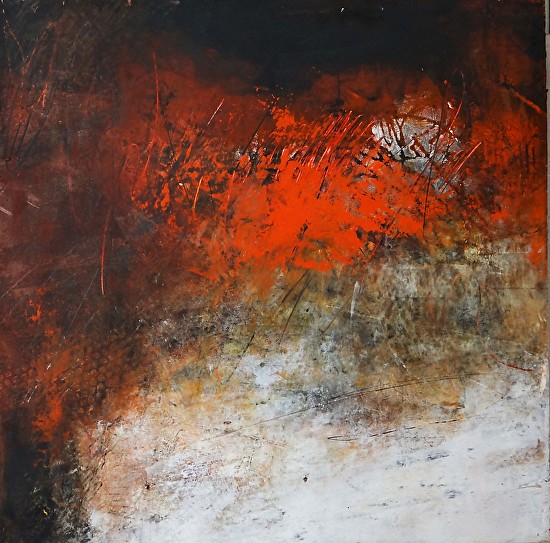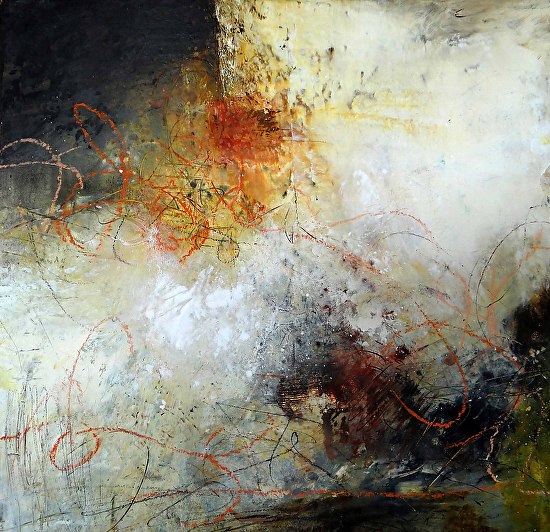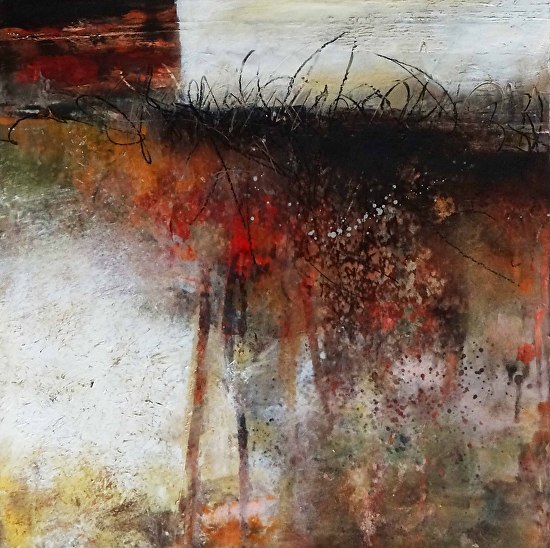
In every story Clarissa began, or even thought of, someone had recently died. There was no other story for her: someone loved, someone irreplaceable, had died, and how did one go on? She told herself it wasn’t because of Jared; it was because everyone dies, and how can one write anything that doesn’t acknowledge that?
For Jared, dying was rich in comic possibilities. He had the worst sense of humor; no joke was too corny for him. “Treat each day as if it were your last, and one day, it will be.” They were jokes he would have told their child, if they’d had one. So he told them to Clarissa, daily, to her anguished moans and protestations: “What’s brown and sticky? A stick.”
Clarissa flew overnight from Boston to Dublin. She faded during the long line going through Customs, twisting through the cavernous, windowless room. She caught a bus to Monaghan, and finally a taxi to the artists’ residency. She was here for two weeks, a trip funded by the university where she taught, to finish a novel. The estate house, in Gothic Revival style, was impressive; the grounds green and rolling down to a tidy lake. Her head swam as the Director showed her around the place, rushing her past the artist studios, making jokes in his Irish accent that left her bewildered. When she made it to her room, she collapsed.
After a time of staring at the posts of the four-poster bed, feeling all the mistakes of her life, including the decision to take this trip to Ireland; her failures in her professional life; her personal unworthiness, and the sense of loss and aching loneliness at the center of it all that she tried not to look at head-on, she fell asleep.
When she woke, it was nearly time for dinner. She opened the drapes and stared at the well-tended gardens in light constantly shifting from clouds moving overhead: early roses, lavender, and lilies. She showered, put on her black dress, and brushed her long brown hair. Maybe there would be single men at dinner, devilishly handsome Irish men or Brits, intrigued by an American woman. She leaned close to the bathroom mirror, drawing a fine dark line around her eyes.
There was just one man at dinner, a white-haired man who sat next to her. He was the husband of the woman across from Clarissa. Painters, they each had a studio in the building that used to be the stables. The man leaned in to Clarissa to hear her speak in a way that reminded her of her father. His wife leaned forward to talk with Clarissa, once reaching across the table to touch her hand. Later Clarissa struck up a conversation with a dark-haired, intense young woman sitting next to her, an essayist from Dublin. The wine helped Clarissa feel loquacious. In this setting, no one knew of her failures, losses and mistakes, or that the novel she was working on was going nowhere. She told the woman, whose name was Siobhan, about her tenure-track position at the state university in the Midwest, and about her two close male colleagues. “They’re both very well-published,” Clarissa said. “And they’re friends.”
“Oh, dear,” Siobhan said, in a way that made Clarissa feel she understood more than Clarissa said; understood something of the paternal tone of the older colleague, and the mild flirtatiousness of the other. Clarissa didn’t want to complain about these men; they were her friends and colleagues, and it was important to keep positive in the workplace. As her mother used to remind her, no one is perfect. “Not even you,” she would say, looking pointedly at her daughter.
There was just one person who thought Clarissa was perfect, and he was gone.
In the morning Clarissa stared at her fingers, resting on the laptop’s keyboard. Left index on F, right index on J, waiting to be told to move. The novel waited on the lighted screen, truncated, partial, and longing. She’d started writing about a young woman who wanted to be a gymnast, but the story shifted until the young woman was older, and had lost her lover in a fire. Clarissa thought this turn might be a bad idea; it seemed obvious to write about a woman who had suffered a great personal loss, but it was all she wanted to write. It was the experience she knew best. Her fingers hesitated on the keys. She wanted her character to grieve, and then fall in love again, and discover she was loved in return. The thought made her embarrassed. Surely that wasn’t enough to write about; surely she needed a darker, more complicated vision.
Three fat flies buzzed at the window in front of her, trying helplessly to get to the garden. The window was closed but she saw it could open at the top, with a lever pushed straight out. Standing on the chair, then climbing onto the desk in her bare feet, Clarissa pushed the window open and secured it. Climbing down, she took a piece of paper from the desk, and pushed its edge gently against one of the flies. She finally got the fly to step onto the piece of paper, and remain there while she climbed back on the desk and tapped it out the window. “There you go, dummy,” she said. She climbed down and back up again with the next fly, and the third. Standing on the desk, tapping the paper out of the crack of the open window, she watched the fly zoom away into the overcast sky, then looked down to see a man, standing in front of her on the garden walk.
He turned away with a smile, embarrassed to be caught watching. From his position on the sidewalk it would have been hard not to notice her, standing full-length in front of the window and reaching up. Still, it had been worth the effort to stop hearing their anxious, desperate buzzing. She sat back on her chair, pushed it up to the desk, and looked at her keyboard.
None of her characters died of cancer, which is what her fiancé died from; she chose more dramatic deaths. Fire, or car crashes, or suicides; something sudden, rather than the slow, sad slog that had been the approach of Jared’s death. She hadn’t really known he was going to die, even though she should have known, until all of a sudden it was time to call his parents. She had never found the right time to tell him that, when he got better, she wanted to try for a child. It was what he’d wanted, all those years, a decision they disagreed on that kept them from settling on a date for a wedding. She was in grad school, then starting a stressful new job; where was there time to be a mother? Then, when she felt ready, he was dying, then suddenly their story was over.
She didn’t want to write a character as stupid as Clarissa had been. She wanted her character, Amanda, to be perceptive, intuitive, and courageous. She wanted someone to fall helplessly in love with Amanda, and for Amanda to fall in love also, after she finally determined the man was for real. Like Jared had been for real. It had taken a long time for Clarissa to finally believe that, and to trust.
There were new people at dinner that evening: a couple of women who were sharing a cottage and working together on a play, and the man who’d seen Clarissa at the window. Shaking her hand, he said, “I’m so sorry about earlier. I couldn’t help watching; I thought you might fall forward through the window, and I would need to be there to rescue you.” He had gray streaks in his dark curly hair and a bit of softness around his middle. Clarissa thought he was British, but he said his accent was originally Australian. “Tempered by years of living in Dublin.” His name sounded vaguely familiar, Dillon Burnham. He asked her name, and what she was working on, and saw him search his memory for any trace of her.
“You wouldn’t have heard of me,” Clarissa assured him. He sat next to her at the table. Throughout dinner she was aware of him, of his arm close to hers. She talked with one of the playwrights. Carol and Isabel were from Belfast. Carol talked about the community theater she worked with, the plays she’d written, their progress on this one.
Clarissa knew she should talk of her own work, but she didn’t want to; it felt private to her, wrong to discuss. Instead she asked more questions of Carol, and nodded thoughtfully, pretending to listen.
Clarissa slept deeply, waking only once when she opened her eyes to darkness, forgetting where she was, what this room was, what this building was. For a brief moment, she thought Jared might be lying next to her in the house they used to live in together, and reached to feel for him. It wasn’t until she was standing in the dark room, feeling the walls, that it came back to her: she was in Ireland, at the Artist Residency. That was her desk, that was the door that led to her bathroom.
In the morning, she was glad she didn’t have to talk to anyone when she helped herself to the food set out on the counter; she was not a morning conversationalist. Jared was more energetic in the morning, but had learned to save conversation, and especially jokes, until later. That was one of the things that it takes time to learn about a person. She didn’t know if she could ever do that again: take the time to adapt to someone, to their snoring, for example, and have them take the time to adapt to her. She thought of the things she did that used to annoy Jared: take too long to leave the house when they were going out, always remembering one more thing she needed, or a last-minute change of shoes. They were getting over these minor irritations, finding ways to reach their affections around the things that irritated them, and Clarissa had just begun imagining what it might be like to have a child with this man, when he became ill.
But for that short time their relationship had been a success for Clarissa, a flash in her life. So brief, it seemed now, the five years they’d been together; a gasp, a kiss, a moment, and it was over, Jared gone as if he’d never been.
Clarissa took the time to look up on her laptop poems by Dillon Burnham. He was quite accomplished, with several well-reviewed books and a major British award. It was strange to be reading the words of someone who was in one of the rooms next to her, just beyond a wall. The language of the poems was vigorous, with exact, unsentimental observation of nature. She particularly liked one that came around to the subject of death, and the loss of the loved one’s eyes. She thought the writer of that poem must understand loss. It helped her move back into the novel; she imagined Amanda remembering her dead lover’s eyes. Clarissa made those eyes gray, the same color Jared’s eyes had been.
At dinner Clarissa sat between the two playwrights. They were a couple, she presumed, thought she wouldn’t have guessed that either of them were gay. Carol had curly red hair and Isabel was tall and thin, graceful, with long blond hair. Isabel took an interest in Clarissa’s work, asking her what it was like to teach creative writing in the United States.
Clarissa was aware of Dillon Burnham at the other end of the table, glancing their way. After dinner, Carol and Isabel stood and apologized for leaving: “Back to work!” Carol said, dropping her napkin on the table.
“She’s a rough taskmasker, she is,” Isabel said, and followed Carol out the door. Dillon moved to sit next to Clarissa, bringing his bottle of wine with him. He filled Clarissa’s glass. “Cheers,” he said, and raised his glass. “How’s the writing going?”
“Let’s not talk about that,” Clarissa said. “I read some of your poems,” she confessed.
She watched a faint pink spread up the sides of his face. “Oh, no,” he said.
“They are quite beautiful.” She couldn’t remember the name of the poem, but said “My favorite is the one about the eyes.”
He raised his glass again. “Here’s to the writing of Clarissa, of which she doesn’t wish to speak. May her characters suffer a better fate than her namesake.”
He was referring to the heroine of the novel by Samuel Richardson. That Clarissa was abducted and raped, but fought for her virtue to the end. “My parents had not read that book,” she said, “Or they might have thought twice about naming me.”
“It is a beautiful name,” Dillon said.
Outside the glass doors, the evening was soft and gray, bushes shaking in the wind. “Would you walk down by the lake with me?” Dillon asked. They filled their glasses and walked down the gravel path to where the lake shone, one white swan drawing lines across its surface.
“This is simply ridiculous,” Clarissa said. Dillon looked at her. “All this.” She gestured with her wine glass. “The building, the lake, the grounds. Ridiculously beautiful,” she said.
They stood by the water, watching the swan cut the lake in half with a smooth line. Dillon taught literature at Trinity, and played the cuislenna, an instrument he described as a small Irish bagpipe, but he didn’t mention a wife. Clarissa kept thinking of the eyes of the poem, and of a pair of gray eyes she couldn’t forget. She wanted to tell him of her sorrow, and see if he had something similar to share. Jared’s death had occurred just nine months ago. Long enough to grow a baby, if she’d been able to do that. She stood tense, and instead of saying anything about eyes, blurted out, “Did you hear about the black swan that walked into a pub?”
“No . . .” Dillon said, turning to face her.
“The bartender says, ‘Hey, I named this pub after you!’ The swan says, ‘What, Dave?’”
Dillon chuckled politely. Clarissa felt a flush of embarrassment. What had gotten into her? After a quiet moment he said, “The lake is just the color of a Turner watercolor, don’t you think?”
Clarissa bit her lip, searching her memory for Turner’s watercolors. When she confessed that she didn’t have a clear image of Turner’s paintings of lakes, Dillon said he would show her one. He wanted to go fetch his computer now, but she said no. “Tomorrow,” she said. “Eleven o’clock. We’ll meet in the kitchen.”
They said good night in the darkened kitchen. Clarissa impulsively reached over and took his hand. He was so kind, his eyes looking down at her warmly. “Good night,” she said. “It was a pleasure.”
He took her hand to his lips and gave her thumb a quick kiss. “Dear Clarissa,” he said. His low voice rumbled through her. She slipped away to her room without saying anything else. There would be tomorrow to talk.
In her room Clarissa lit a low lamp and looked at herself in the mirror. The evening had gone well, except for that ridiculous joke about the swan. In bed, she lay in the darkness, smelling the faint scent of laundry detergent on the sheets, feeling the sensation of her hand being brought up to his lips. As she was beginning to drift off, she heard a familiar voice say, What do you call a fish with no eyes? And the answer, Fsshh.
In the morning, Clarissa looked up more of his poems, but she refrained from looking up Turner’s work. A few minutes before 11:00, Clarissa wandered into the kitchen and sat casually at the table by the glass doors. The room was empty but for a staff member wiping up the floor with a mop. Clarissa poured herself another cup of tea, added a drop of cream, and sat back at the table.
She heard a door open in the hallway, footsteps, and the white-haired man she’d met her first night shuffled into the kitchen. He waved, then went out the door and down the gravel walk. The day was overcast again, though a suffused light came through the clouds. She could see figures down by the lake, people walking, but she couldn’t make them out, then their heads dipped below the rise of the lawn.
At 11:20, Carol pushed open the glass doors and entered the kitchen, her red hair wild around her face. She went over to the coffee machine and pushed the button for espresso. “How’s it going?” she said to Clarissa.
“Well enough. Is your work going well?”
“It has been, yes. Isabel seems to have taken off . . .” Carol glanced down toward the lake. “Taking a walk, I guess. Oh well, I need a break too. My husband is waiting for a phone call.” She sipped the espresso. “Don’t want him to think he’s forgotten, now, do we?” Behind her, the couple walking by the lake came into view again, this time close enough for Clarissa to see that it was Isabel and Dillon, walking slowly, thoughtfully, deep in conversation.
Back in her room, Clarissa looked up the painter J.M.W. Turner on her laptop. His paintings seemed to be mostly of the ocean, many of them set in Venice; only one reminded her of the lake at all. It was called “The Blue Rigi,” and was an image of a Swiss mountain, Mount Rigi, as seen from Lake Lucerne. The gray and blue colors were similar to the colors of the water last night. The painting reminded her of sadness.
She opened a new file. Jared’s eyes were gray, she wrote. They reminded me of a smooth gray stone. When he opened them in the morning, he would make a joke. He would be sick, about to vomit, knowing he was to die soon—and he would make a joke. A terrible joke, but a joke nonetheless. “How does a train eat? It goes chew, chew.”
She would write Jared alive on the page, for herself if for no one else. There was no more of him left in the world, no child with his smile. She would recreate him, breathing, making stupid jokes for her, Clarissa, just to get her to smile. Dillon Burnham wasn’t what was important to her life. She would smile when she created Jared again on the page, smile when she remembered his terrible, terrible jokes. What did the finger say to the thumb? I’m in glove with you. She would write about the way he tried to pretend he didn’t feel too bad, even as he grew pale, and the pain made him pant for breath. He did that for her. She would write about his death, how she told him to close his gray eyes and rest, not knowing he would never open them again. She would spend this entire residency writing Jared alive again, and then letting him die, and when she was ready—when she was good and ready, not a moment before—she would say goodbye.
Patricia O’Donnell is the author of the newly released novel, The Vigilance of Stars. Her other books include the novel Necessary Places, the memoir Waiting to Begin, and the short story collection Gods for Sale, which won the Serena McDonald Kennedy Award. Her short work has appeared in many places, including The New Yorker. She is a professor of Creative Writing in the University of Maine at Farmington’s BFA Program.



